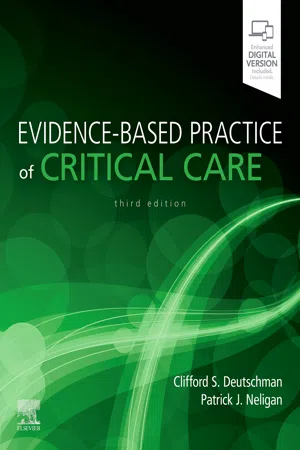
Evidence-Based Practice of Critical Care E-Book
- 688 pages
- English
- ePUB (mobile friendly)
- Available on iOS & Android
Evidence-Based Practice of Critical Care E-Book
About this book
Approach any critical care challenge using a practical, consistent strategy based on best practices with Evidence-Based Practice of Critical Care, 3rd Edition. Unique, question-based chapters cover the wide variety of clinical options in critical care, examine the relevant research, and provide recommendations based on a thorough analysis of available evidence. Drs. Clifford S. Deutschman and Patrick J. Nelligan, along with nearly 200 critical-care experts, provide a comprehensive framework for translating evidence into practice, helping both residents and practitioners obtain the best possible outcomes for critically ill patients.- Covers a full range of critical care challenges, from routine care to complicated and special situations.- Helps you think through each question in a logical, efficient manner, using a practical, consistent approach to available management options and guidelines.- Features revised and updated information based on current research, and includes all-new cases on key topics and controversies such as the use/overuse of antibiotics, drug resistance in the ICU, non-invasive mechanical ventilation, frequency of transfusions, and duration of renal replacement therapies.- Provides numerous quick-reference tables that summarize the available literature and recommended clinical approaches.- Enhanced eBook version included with purchase. Your enhanced eBook allows you to access all of the text, figures, and references from the book on a variety of devices.
Frequently asked questions
- Essential is ideal for learners and professionals who enjoy exploring a wide range of subjects. Access the Essential Library with 800,000+ trusted titles and best-sellers across business, personal growth, and the humanities. Includes unlimited reading time and Standard Read Aloud voice.
- Complete: Perfect for advanced learners and researchers needing full, unrestricted access. Unlock 1.4M+ books across hundreds of subjects, including academic and specialized titles. The Complete Plan also includes advanced features like Premium Read Aloud and Research Assistant.
Please note we cannot support devices running on iOS 13 and Android 7 or earlier. Learn more about using the app.
Information
- 1. Has evidence-based medicine changed the practice of critical care?
- 2. Do protocols/guidelines actually improve outcomes?
- 3. What happens to critically ill patients after they leave the ICU?
- 4. What can be done to enhance recognition of the post-ICU syndrome (PICS)? What can be done to prevent it? What can be done to treat it?
- 5. How have genomics informed our understanding of critical illness?
Has evidence-based medicine changed the practice of critical care?
- 1. We need to look beyond single randomized clinical trials (RCTs).
- 2. It is the small things that make a difference.
- 3. Accountability is critically important.
- 4. We often need to do less to patients rather than more.
- 5. It is the multidisciplinary intensive care unit (ICU) team, not the individual provider, that is the most responsible for good clinical outcomes and high-quality critical care.
Looking beyond single randomized controlled trials
Small things make a big difference
Accountability is important
Table of contents
- Cover image
- Title page
- Table of Contents
- Copyright
- Dedication
- Contributors
- Preface
- Is hypothermia useful to prevent brain injury after cardiac arrest? In other settings?
- SECTION 1. Critical Care and Critical Illness
- SECTION 2. Basic Respiratory Management and Mechanical Ventilation
- SECTION 3. Non-ARDS and Noninfectious Respiratory Disorders
- SECTION 4. ARDS
- SECTION 5. General Critical Care Management
- SECTION 6. Sepsis
- SECTION 7. Persistent Critical Illness
- SECTION 8. Infection
- SECTION 9. Hemodynamic Management
- SECTION 10. Cardiovascular Critical Care
- SECTION 11. Kidney Injury and Critical Illness
- SECTION 12. Metabolic Abnormalities in Critical Illness
- SECTION 13. Neurological Critical Care
- SECTION 14. Nutrition, Gastrointestinal, and Hepatic Critical Care
- SECTION 15. Endocrine Critical Care
- SECTION 16. Trauma, Surgery, Obstetrics, and Environmental Injuries
- SECTION 17. Hematology Critical Care
- SECTION 18. Critical Care Resource Use and Management
- SECTION 19. Patient Suffering and Other Ethical Issues
- Index